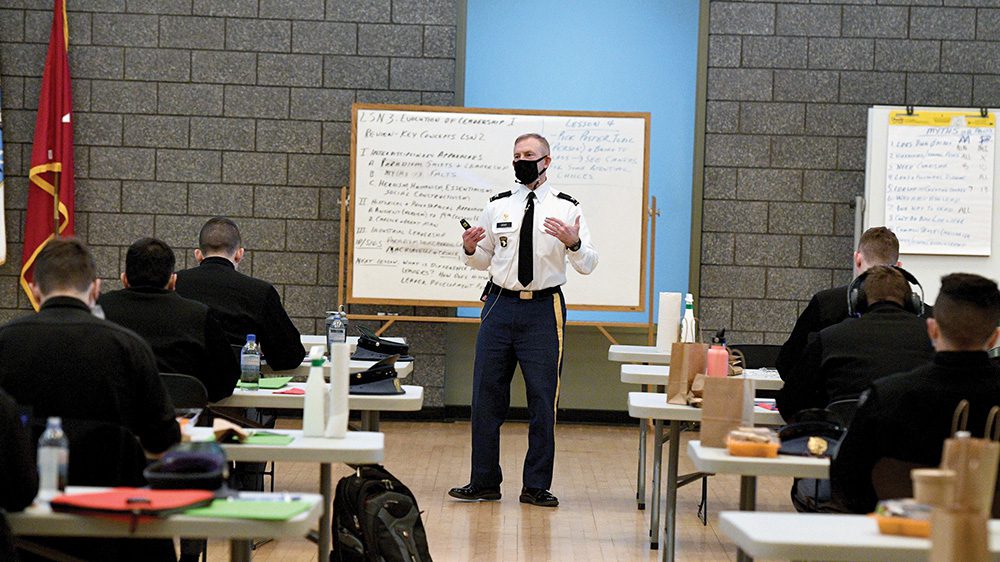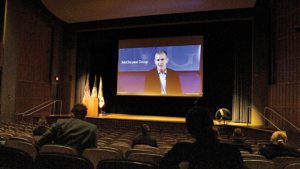Virtual Leadership Conference Focuses on Teamwork

Col. Dave Gray, Center for Leadership and Ethics director, instructs cadet facilitators the week leading up the conference in the Hall of Valor.—VMI Photo by Kelly Nye.

Col. Dave Gray, Center for Leadership and Ethics director, instructs cadet facilitators the week leading up the conference in the Hall of Valor.—VMI Photo by Kelly Nye.
Held virtually Feb. 15-16, 2021, the 11th annual Leadership and Ethics Conference was sponsored by the Center for Leadership and Ethics. It attracted a crowd of more than 275 attendees—among them, members of the VMI community and students from a wide range of secondary schools, colleges, and universities. This year’s conference theme was “Strong Leaders, Strong Teams,” a motif aligned with the Center’s 2020-21 programming theme, “Teamwork: Out of Many, One.”
Kicking off the conference as keynote speaker was retired Marine Corps Gen. Richard “Butch” Neal, the center’s leader in residence for this academic year. Neal, a four-star general who served in both the Vietnam War and Operation Desert Storm, was assistant commandant of the Marine Corps from 1996-98.
In his remarks, Neal discussed how he learned teamwork and responsibility as a child by helping with the never-ending labor on his uncle’s dairy farm. Later, in Vietnam, Neal was put in command of a company that had suffered sudden and heavy losses in combat. In that role, he developed what he calls “eyeball-level leadership.”
The cornerstones of that philosophy, he related, are moral courage, dedication, integrity, and judgment. “This creates a climate of trust and loyalty, a culture of engagement, and a commitment in your teammates,” he stated.
Neal explained that his style is one of “we, not me,” and “us not I.” With that mindset, he noted, subordinates are freed to reach their full potential. “The goal is to make people feel needed and highly valued,” he said. “The leader does the molding.”
Also speaking, this time on the topic of leadership and communication in the workplace, was Shari Harley, a specialist in business communications and the author of How to Say Anything to Anyone: Setting Expectations for Powerful Working Relationships. Harley was this year’s Caroline Dawn Wortham ’12 leadership speaker. The speaker series was established in memory of Wortham, a track and field athlete at VMI who died after being struck by a car while bicycling in 2015.
In her remarks, Harley stressed that while she never met Wortham, who was preparing to enter the Marine Corps at the time of her death, she had talked to several people who knew her to get a sense of her communication style. “[Wortham] was direct with compassion,” Harley stated. “You always knew where you stood with Carrie.”
That style, she noted, establishes trust, which is the bedrock of effective communication. “Carrie reduced defensiveness because she had a relationship of trust,” Harley commented.

Cadets listen to Gen. Stanley McChrystal deliver his talk virtually in Gillis Theater.—VMI Photo by Kelly Nye.
The next day’s speakers included Ben Freakley, mental performance coach for the Toronto Blue Jays and a former men’s soccer coach at VMI. In his presentation, Freakley discussed dangerous assumptions about leading teams and then shared his seven lessons of leadership. Among his mantras are, “Hog the blame, share the glory,” and, “We don’t learn from experience. We learn from reflecting on experience.”
During his talk, Freakley had participants go into breakout rooms to discuss what assumptions they had about leadership and, later, how to build trust.
Concluding the conference and giving the H.B. Johnson ’26 Distinguished Speaker Series lecture for this academic year was retired Army Gen. Stanley McChrystal, former commander of U.S. and International Security Assistance Forces, Afghanistan, and author of Team of Teams: New Rules of Engagement for a Complex World.
Drawing from his decades of military leadership experience, McChrystal discussed what he learned while leading the Joint Special Operations Command against al-Qaida, a position he held from September 2003 to August 2008. Al-Qaida, the general noted, was unlike previous enemies the U.S. military had faced in that it was not a top-down organization. Rather, its strength lay in quick communication between cells.
Compounding the problem, he stated, was the “walls between silos” that kept U.S. organizations from sharing information and working well together. Once JSOC changed its culture, he noted, success in defeating al-Qaida ensued.
Next, McChrystal discussed his time as director of joint staff in Afghanistan from 2009-10. In that position, he quickly discovered that sometimes what was happening on the ground didn’t match up with the orders he’d given from headquarters, so it was vital to trust those closest to the situation. Because of this, McChrystal developed a policy of, “Execute the order we should have given you.”
In addition to the featured speakers, conference attendees heard prerecorded comments on leadership from members of the Institute faculty and staff, and they also had access to prerecorded talks by 1st Lt. Samantha Shepherd ’18, Elise Woodworth ’07, Lester Johnson ’95, and U.S. Marine Corps Capt. Joey Bishop ’14.